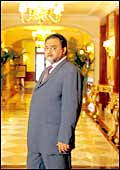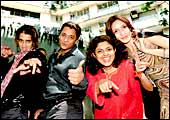 |
| Sony TV's Dasgupta: Happy to be #2? |
Even
by the entertainment industry standards, Sony Entertainment Television's
(SET) 10th anniversary bash on October 22 in Mumbai was a spectacle
to watch. Stars from its popular shows such as Jassi Jaissi Koi
Nahin, Yeh Meri Life Hai and CID walked the ramp, contestants
from its reality shows Indian Idol and Fame Gurukul belted out
numbers, as did Canadian-born, UK-based rapper Raghav, who was
flown in especially for the occasion. Kunal Dasgupta, SET's CEO,
was of course happy at his television company completing 10 years
in India, but he was possibly happier for the chief guest he had
managed to rope in-Sony Corporation's worldwide CEO of six months,
Sir Howard Stringer. The significance of his visit wasn't lost
on anyone. Not only was Stringer the first Sony CEO to visit India
in 10 years, but he was also the man who headed Sony's movie business
in the US prior to his elevation and, therefore, very interested
in entertainment business. "It feels like an orphan has finally
been adopted," a jubilant SET executive told this writer,
summing up the mood within the company, which is the only TV network
Sony operates anywhere in the world.
It's easy to see why the SET honchos are
on a high. Finding an ally as powerful as the CEO apart, the network's
weekly gross rating points (that is, total television rating points,
or TRPs) are up at 100-120 versus 70-80 a year ago, thanks to
new shows such as Indian Idol and Fame Gurukul. Better still for
SET, the gains in viewership seem to have come at the cost of
leader star TV, whose GRPs have slipped to 280-300 from 380-400.
That means its #2 position, held for the last four years, is under
no immediate threat from Zee Telefilms. What's more, SET's GRP
gains are showing up on its books. Its advertising revenue, which
accounts for 70 per cent of its total earnings, jumped 40 per
cent last year after clipping at 30 per cent the previous three.
So Dasgupta, CEO of 10 years, should be sitting
pretty, right? Well, not quite. He's got issues to deal with,
the most pressing of which is the possible coming on board of
new financial or strategic investors. A group of shareholders-including
actor Jackie Shroff, World Media Group's Sudesh Iyer and Raman
Maroo of Shemaroo Film-that owns 32 per cent stake in SET wants
out. The network won't buy them out and it won't make a public
offering either (there's been talk of one for the last five years),
leaving the investors with little choice. "We invested in
SET 10 years ago hoping to reap a rich dividend eventually. Since
the IPO doesn't seem to be happening, we are looking at other
options," Shroff told BT over the phone during a shooting
break in London.
Among the buyers being talked to is Anil
Dhirubhai Ambani of the eponymous enterprise. Both SET and ADAE
have rubbished the reports as tittle-tattle (however, Stringer
did make time to meet with Ambani during his visit), but Ambani's
interest in media and entertainment is obvious. Soon after he
split from his elder brother Mukesh in June this year, he acquired
stakes in entertainment companies like Adlabs Films and Prime
Focus. He also plans to launch a direct-to-home network and may
well fancy the idea of landing a significant position in the #2
television network.
The only hitch could be SET's valuation.
According to Shroff & Co's own valuation of $1 billion or
Rs 4,500 crore, a 32 per cent stake may cost Ambani $320 million
or Rs 1,440 crore. (Some analysts, however, believe that SET is
worth at least $2 billion.) From the initial talks with Ambani,
it seems he is unwilling to cough up that sort of money. "The
stake might (then) have to be picked up by some institutional
investors and, meanwhile, if the perception about Sony improves,
we may think of an IPO in the next 12 to 18 months," says
a member of the Shroff camp.
What the entry of Ambani or any other investor
will mean to SET is hard to say at this point, but industry analysts
are agreed on one thing: "There are quite a few chinks in
SET's armour that need to be plugged," says Sunir Kheterpal,
Head (Media and Entertainment), Yes Bank. Adds Vivek Couto, Head
of Research, Media Partners Asia, a Hong Kong-based firm that
tracks media companies across Asia-Pacific: "(Unless it addresses
those chinks) it could be bought by some other corporate group
that focusses on a more rounded growth."
INTERVIEW
HOWARD STRINGER/CEO/SONY CORPORATION
"Entertainment is a Core Business
for Sony" |
 Sony
Corporation's worldwide CEO Sir Howard Stringer was
in India recently to celebrate Sony Entertainment Television's
10 years in the country. BT's R.
Sridharan and Archna Shukla caught
up with him to know about his plans for different businesses
of Sony in India. Excerpts: Sony
Corporation's worldwide CEO Sir Howard Stringer was
in India recently to celebrate Sony Entertainment Television's
10 years in the country. BT's R.
Sridharan and Archna Shukla caught
up with him to know about his plans for different businesses
of Sony in India. Excerpts:
Is SET turning 10 a big enough occasion for the worldwide
CEO to drop by, or is there more to it?
It is a big enough occasion for us because SET India team
has put us on the entertainment map in ways we are not present
anywhere in the world.
SET versus SET may have done well in the last 10 years,
but when compared with other competitors, it lags behind
on many fronts.
I don't agree with that. We are very competitive in India.
With star it has just been a difference of one show (Kaun
Banega Crorepati). If we had bought the Millionaire title
like we bought Idol and Fame, we would have remained the
number one network as we were before.
Are there any specific goals you have set your team
here in India?
All I can see right now is that our content here is very
strong and it can drive our hardware sales. But we do have
some plans for our films business. We are looking at opportunities
of co-production with Bollywood directors. We feel that
Indian creative content is really world-class and it's time
it got its due in international markets.
Talking about hardware, India doesn't seem to be a
big focus for Sony, especially after you discontinued manufacturing
here some lines of consumer electronics.
Closing down of factories and laying people off is not
something that has happened only in India. We have done
it in many other markets. And that essentially has got to
do with the shift in our focus from analog to digital business.
Digital strategy is the high-end strategy for Sony.
There have been talks of Sony wanting to spin off some
of its non-core businesses.
We have made it very clear that entertainment and games
are core business for us and consumer electronics is our
basic strength. These are the three strong pillars of Sony
Corp and there is no question of phasing out any of these
businesses. We are promoting a better coordination between
all the three and trying to put across a United Front of
Sony, where the entertainment business will be used to push
the sales of hardware.
|
Chinks in the Bouquet
SET's come a long way since 1995. It beat
Subhash Chandra's Zee with its stupendous programming and targeted
marketing and built on the success of shows like Jassi Jaissi
Koi Nahin by purchasing (for $5 million or Rs 22.5 crore) rights
to international titles such as American Idol and Fame. It then
spent a whopping Rs 50 crore on just promoting the clones Indian
Idol and Fame Gurukul. As it turned out, the money was well spent.
"Unique, compelling and variety entertainment...and 360-degree
marketing are the cornerstones of our growth," says Tarun
Katial, Business Head of SET's flagship channel. "It's not
easy for a challenger to induce new consumption habits among viewers,"
adds Sandip Tarkas, CEO, Media Direction.
So what's the problem? Despite Indian Idol
and Fame Gurukul, none of SET's shows figures in the top 50 programmes
on cable and satellite channels. While, like
OneAlliance (SET's distribution arm) President
Anuj Gandhi argues, the SET bouquet is quite wholesome, the fact
is nine of the 12 channels (including three ndtv channels) don't
belong to SET.
 |
| Despite being #2, Dasgupta has issues to
deal with. The most pressing being the possible coming on
board of new financial or strategic investors |
No doubt, SET's recent acquisition of comedy
channel sab tv has been a shot in the arm, but it still doesn't
have any news or music or English movie channels (like Star and
Zee have), and SET max remains a hybrid between Hindi movies and
sports. Its kids channel Animax has remained a non-starter, and
its action channel AXN has a limited viewership. Result: the flagship
channel fetches more than half of SET's revenues, unless max has
some high-profile cricket matches on air. Also, although Zee is
#3 in the GRP sweepstakes, it pulls in almost as much as star's
$302 million or Rs 1,359 crore in revenues; SET, by contrast,
logged $220 million or Rs 990 crore last year. It is also less
profitable than either star or Zee (see Low Prime Time Ad Rates...).
SET is said to be in talks with Taj TV to
buy Ten Sports, which has quite a few lucrative sports properties
under its belt, but until the deal comes through, its second-biggest
money spinner, MAX, will continue to have a splintered viewership
for movies and sports. "SET is losing out on a big opportunity,
as viewership in all these genres is growing fast," says
a former SET executive, currently running a high-profile TV network.
"(SET) doesn't have a clear strategy for growth," he
adds.
MPA's Couto points out another gap in the
network's strategy: No stake in last-mile distribution. SET doesn't
have any interests in cable and satellite (C&S) distribution
like star (it owns 20 per of Hathway) and Zee (owns Siti Cable).
It has no intentions of launching an alternative distribution
platform like DTH (direct to home) either. Both star and Subhash
Chandra own Tata-Sky (20 per cent) and Dish TV (100 per cent),
respectively.
Dasgupta, however, claims that these seeming
breaches are part of a conscious business strategy. "We see
no logic in getting into news and DTH because of the 26 per cent
and 20 per cent foreign equity restrictions," he says. "As
for the English movie channel, we are looking at launching one
soon," he adds. Not having a distribution business, Dasgupta
says, actually helps SET, since there is no conflict of interest
with competitors. "Moreover, there is no bandwidth available
with existing operators to accommodate new channels," he
justifies.
SET also denies the industry buzz that Sony
may be contemplating hiving off the broadcast business. "SET,
in fact, has been identified as the cornerstone of Sony Corp's
overall growth in the country," claims N. P. Singh, SET's
Chief Operating Officer. Stringer has been talking of getting
the diverse Sony businesses to present a "united front"
in all markets. Yet, it is early days to predict how successful
the strategy will be, and whether a better coalition within the
group can compensate for the weak links in SET's broadcast strategy.
For the moment, SET seems happy being the #2. But Stringer may
want to take a call on it while the going is good.
|








 Sony
Corporation's worldwide CEO Sir Howard Stringer was
in India recently to celebrate Sony Entertainment Television's
10 years in the country. BT's
Sony
Corporation's worldwide CEO Sir Howard Stringer was
in India recently to celebrate Sony Entertainment Television's
10 years in the country. BT's 